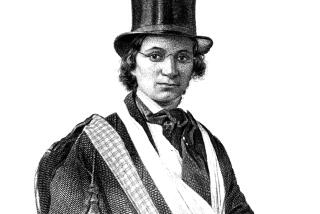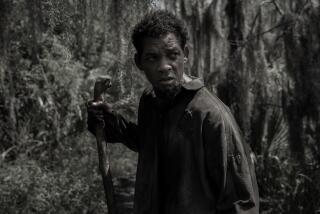‘Django Unchained’: Quentin Tarantino tells a slave tale
- Share via
Not even a good dinner with an Oscar-winning actor can get in the way of Quentin Tarantino and his stories.
According to Christoph Waltz, who landed his golden statuette for his scene-stealing performance in Tarantino’s last revenge tale “Inglourious Basterds,” the brainy writer-director was scheduled to meet Waltz for dinner last year. But Tarantino was deeply immersed in writing his new film, “Django Unchained” and called off the dinner moments before the two were set to dine.
“He called and said, ‘Sorry, we can’t meet. I’m writing and I’m so curious how the story ends up,’” relayed Waltz during an interview at this year’s Comic-Con where Tarantino unveiled new footage of the film to 6,000 fans who responded with a standing ovation. “He said that. He writes behind his characters so he creates them, then he sets them free and he documents what they are doing in his head. It all lives in him.”
VIDEO: Trailers to upcoming films
What’s emerged this time from the fruitful brain of Tarantino is an audacious amalgam of a spaghetti western and an American slavery tale. And in similar fashion to the revisionist history he created in “Basterds,” in which the Jews kill Hitler during World War II, “Django” centers on a slave empowered to enact revenge on the men who destroyed his marriage and sold away his wife.
Waltz plays Dr. King Schultz, a German dentist-turned-bounty-hunter who frees Django (Jamie Foxx) and makes him his partner. He is part of a star-studded cast that also includes Leonardo DiCaprio, Samuel L. Jackson, Kerry Washington, and Jonah Hill as a clansman.
The film, which opens on Christmas, is sure to have critics. Stories about race and slavery are always a delicate matter, especially when told by a white filmmaker. But Foxx hopes that the film, which doesn’t pretend to be an accurate historical account, will prompt a dialogue among moviegoers.
GRAPHIC: Holiday releases and the awards race
“This actually gives us an opportunity to entertain and to educate people that are wondering what slavery is about,” said Foxx. “Young kids, black and white, but especially black kids, they don’t know about slavery today. So before the movie comes out, I hope we can talk about what happened in this country. I think we are grown enough to do it now.”
PHOTOS AND MORE:
VIDEO: A guide to upcoming movies
The Envelope: Awards Insider
PHOTOS: NC-17 movies: Ratings explained
More to Read
Only good movies
Get the Indie Focus newsletter, Mark Olsen's weekly guide to the world of cinema.
You may occasionally receive promotional content from the Los Angeles Times.










